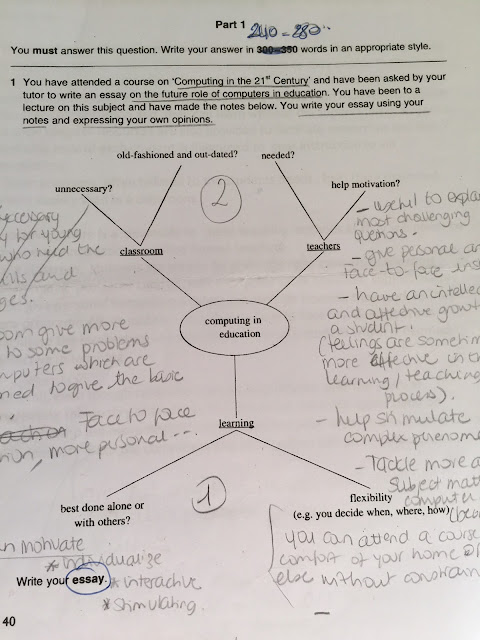A warm hello to all our CPE-holders and CPE-takers, and congratulations to all of you who have recently passed the exam. I am always glad when you write me to say you achieved a certificate. We certainly share your happiness in this blog.
Anyways, for all of you who still don't have a CPE certificate and are planning to get it soon, here there is more practice !
The following essay was sent to us by a very good friend to this blog: SYB, a blogger from France.
Please note that the task comes from an old versión of the exam, and that is why it is in the form of a graphic. In the new versions of CPE, you get two pieces of text (no graphic) and you are asked to summarise both of them.
The education of the future
In the next
decade, the advent of new technologies will bring change to the traditional teaching and
learning models. It may be even the case that human teachers will be replaced by computers and robots. However, it remains to be seen if
this new approach in education can be
effective and beneficial for both the teachers and the students.
Nowadays many educational instutions are offering e-learning
courses. These offers are highly convenient as learners can join the classes anywhere,
from the comfort of their own home and without time constraints. The interactivity factor
of video conferences, microphones and chat-rooms makes them also fun and stimulating.
Another reason why e-learning is so attactive is that, there are in the web numerous free application and on-line resources for self-Learning. These programs, very often tailored to the students needs , help them
master the skills they want, at the speed they want. Once again very convenient.
However, there
is a downside to these teaching methods, and it has to do in my opinion with the essence of human nature and also with the future. In a world which is constantly in social crises and which faces so many environmental challenges, are we not forgetting something?
It is in "old-fashioned" classrooms where students learn to live together, and where they develop friendships and learn important life-skills under the eyes of a friendly supervisor. It is also teachers, and not robots, who can teach students to think outside the box, and to be creative.
It is in "old-fashioned" classrooms where students learn to live together, and where they develop friendships and learn important life-skills under the eyes of a friendly supervisor. It is also teachers, and not robots, who can teach students to think outside the box, and to be creative.


No comments:
Post a Comment